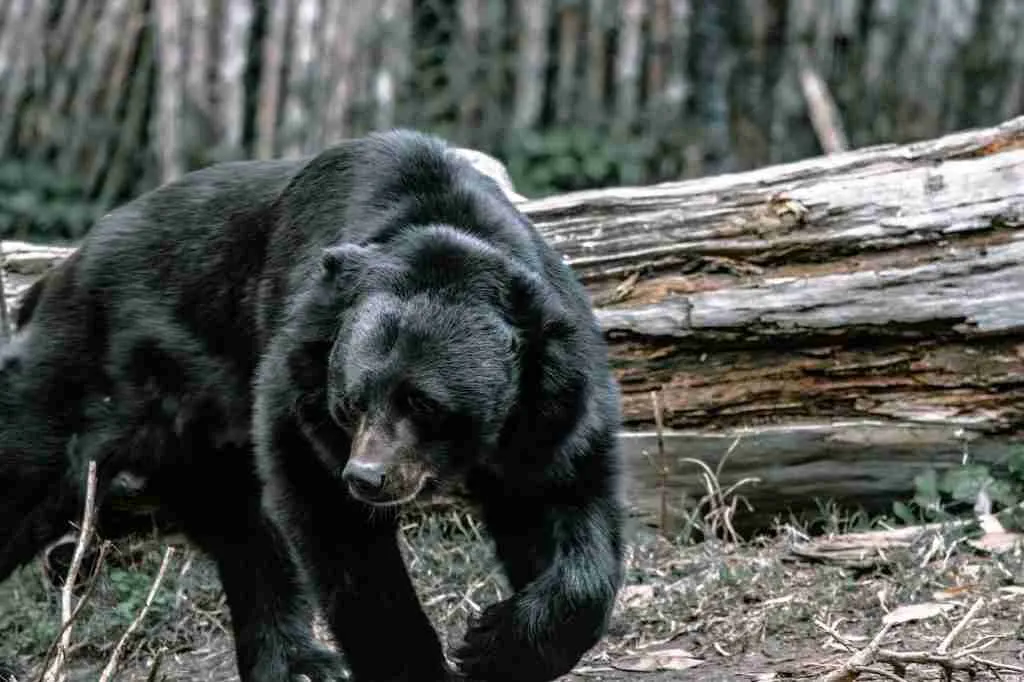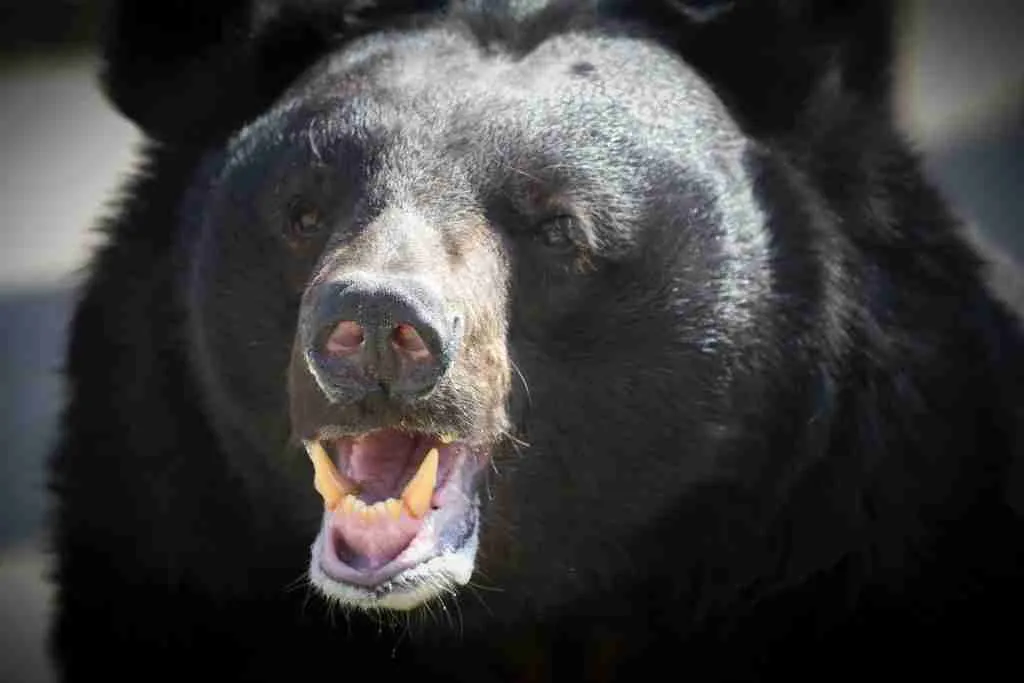Black bears are curious creatures with hyperactive senses that are beyond that of humans. There’s a common saying that black bears can smell fear. But how true is this?
Here’s what I found out:
Yes, black bears can smell fear in other creatures around them. They can sense fear in another animal through their posture, scent, behavior, and vocalizations.
However, after sensing fear in an animal, they do not attack immediately. In most cases, they would study the animal for a while before deciding their next move.
Now you know that black bears can smell fear. But how do they manage to sense it?
In this article, I’ll discuss how black bears can tell if someone is afraid, what to do in such an encounter, and more.
Let’s find out!
Table of Contents
- How Do Black Bears Sense Fear?
- Will Black Bears Attack If They Know You’re Afraid?
- Should I Be Scared of Black Bears?
- Black Bear Encounter – How Should You React When You See a Black Bear?
- Related Questions:
- Recap:
How Do Black Bears Sense Fear?

I conducted in-depth research and discovered that black bears can sense fear in many ways. In this case, some of the main ways included:
Scent Changes/Chemical Release
When humans and other animals get stressed, their bodies may release certain chemicals. These chemicals affect the natural scent, and black bears can smell this.
Black bears may get cautious after noticing these scent changes. Understand that these scent changes do not occur in humans alone.
Other animals may also have scent changes. Hence, black bears sense fear in other animals this way too. Some animals may release chemicals when they experience stress due to fear.
Black bears can smell these chemicals and, in turn, sense fear. Note that black bears sometimes notice and interpret chemical changes as environmental changes.
In this case, the animal experiencing the chemical changes may not be in sight with the black bear.
Body Language
Change in posture is a natural occurrence when humans and other animals are stressed. In this case, black bears will notice the discomfort and sense fear.
Some of the body language that black bears study could be:
- Rapid movements
- Unusual gestures
- Tense posture
Vocalizations
Black bears can also sense fear when animals make different sounds. In other words, screaming and breathing heavily can tell a creature is scared.
To clarify, black bears usually interpret certain vocalizations as alarming and unusual. Therefore, these sounds make black bears decide what to do, whether to leave or defend themselves.
Heart Rate Increase
An increase in heart rate is one of the most common occurrences in many animals when they have fear. So, black bears can easily sense this and conclude that the animal is scared.
Black bears have a good awareness of their surroundings and perfect hearing ability. As a result, they can hear fast heart rates even from a distance, thus sensing fear.
Will Black Bears Attack If They Know You’re Afraid?

No, black bears will not attack when they sense fear in a person or an animal. In fact, they will feel more scared and fear an attack towards them.
In most cases, black bears will try to avoid any upcoming conflicts involving them. For example, if they spot humans, they will first try to retreat even after sensing fear.
On the other hand, if the situation goes further, black bears may begin charging. Charging helps them push away the threat.
Keep in mind that the charges are usually just bluffs in most cases. In other words, it’s a move of self-protection without actually attacking.
Should I Be Scared of Black Bears?
No, you should not be scared of black bears since they are probably more scared of you. In addition, there are very few cases of black bears attacking humans.
In fact, if you stay calm in the presence of a black bear, it will probably go away on its own due to fear. In addition, note that black bears may hurt people occasionally, but only when desperate.
For example, black bears may hurt you when you accidentally stumble on their cubs.
Black Bear Encounter – How Should You React When You See a Black Bear?
You should react to a black bear depending on the immediate scenario. For example, if a bear:
Approaches You
- Stay still, stand your ground, and avoid movement first.
- Try to raise your arms, jacket, or clothes to look bigger.
- You may also stand on a rock or any object that may make your appearance larger.
- You may back away steadily if the black bear stops approaching you.
- If the bear continues to approach you, try making loud sounds that may scare it away.
- When making noises, you may say “Hey bear” several times!
- If the black bear keeps coming, get your bear spray and prepare for action.
- Remember to give the black bear an escape route. Make way for the bear to leave slowly without feeling any concern.
Follows You
- Consider stopping immediately.
- Try clapping and waving your arms several times to scare away the black bear.
- Compose yourself and try as much as possible to stay still.
Makes Contact
- Try fighting back with anything on you.
- Do not pretend to be dead at all costs.
- If you have a phone or radio, consider calling for help.
- Spray it with your bear spray; while doing this, always aim for the face.
Related Questions:
Are Black Bears Scared of Humans?
Yes, black bears are more scared of humans than we are scared of them. Despite being more than three times heavier than the average human, these mammals are quite shy.
In addition, they prefer having their own space and keeping some distance from humans. This way, they avoid conflicts with humans.
Can Black Bears Smell Blood?
Yes, black bears can smell blood from several miles away. Additionally, when the wind blows in their direction, these mammals tend to have an increased sense of smell.
Therefore, these winds can make them smell blood from even further distances.
How Far Can Black Bears Smell?
Black bears can smell between 18 miles (28.9 kilometers) to 20 miles (32.1 kilometers). On the other hand, remember that winds can also affect the distances black bears can smell.
Wind directions may improve or reduce the smelling ability of a black bear. To clarify, winds going against the direction of the smell will reduce the black bear’s smelling ability.
Black bears may have a better chance of smelling things from long distances if the wind is still.
Recap:
In summary, black bears can smell and sense fear in other animals around them. However, they rarely attack because of this except if they feel threatened.
Remember, black bears can sense fear in several ways. Some of the major ways are:
- Changes in scent
- Body language
- Increase in heart rate
- Changes in vocalizations
In case of a black bear attack, remember to:
- Stay still
- Look the black bear straight into the eyes
- Wave your arms and try to appear bigger
- Make noises if it comes closer
- Use bear spray if it attacks
Understand that avoiding encounters with people is a black bear’s nature. Despite this, do not be fooled into thinking that these bears are friendly.
That said, see 5 reasons why black bears are not friendly.
Sources
- How good is a black bear’s sense of smell? – Before the Flood
- Black bear facts: busting misconceptions – Champions for Wildlife

